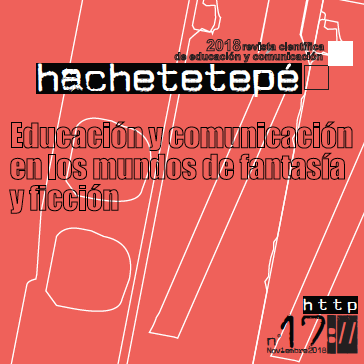In delirium ... Ways to understand education, communication and life
Abstract
Speaking aloud about the monster is nothing new. But doing it from the position of the one who feels and suffers can be unaccustomed. Delirium as an alteration of the mind leads us to reflect aloud. To allow us to say things that in a state of mental fullness would have labeled us an idiot. A thought about the forms that exist about education, communication and life. That is, three legs that hold the coffered ceiling in a way to give it to understand, simplifying and replacing the self with the we, objectivity or subjectivity for the wisdom of what it says. Clearly, a journey through forms that are inspired by understanding, feelings, dreaming and believing.
Keywords
Downloads
How to Cite
License

This work is licensed under a Creative Commons Attribution-NonCommercial-NoDerivatives 4.0 International License.
Those authors who have published with this journal, accept the following terms:
- They will retain their copyright and guarantee the journal the right to first publication of their work, which will simultaneously be subject to the Creative Commons Attribution License . They may be copied, used, disseminated, transmitted and publicly displayed, provided that the authorship, url, and magazine are cited, and are not used for commercial purposes. No derivative works are allowed.
- They may adopt other non-exclusive license agreements for the distribution of the published version of the work (e.g., deposit it in an institutional telematic archive or publish it in a monographic volume) provided that the initial publication in this journal is indicated.
- Disseminate your work through the Internet (e.g., in institutional telematic archives or on your website) once the manuscript is accepted, which may lead to interesting exchanges and increased citations of the published work. (See The effect of open access).
Hachetetepé. Scientific journal of education and communication does not charge a fee for the submission of manuscripts or for the publication of its articles.
References
Agamben, G. (2012). O que é o contemporâneo e outros ensaios. Chapecó: Argos.
Barthes, R. (1972). Crítica y verdad. Siglo XXI editores: Buenos Aires.
Bourdieu, P. (2012). A dominação masculina. Rio de janeiro: Bertrand Brasil.
Canclini, N. (1998). Culturas Híbridas: estratégias para entrar e sair da modernidade. São Paulo: EDUSP; 31-157.
Certeau, M. (1994). A invenção do cotidiano. Petrópolis: Vozes.
Foucault, M. (2010). Os Anormais. São Paulo: Martins Fontes
Muñoz García, J.J. (2003). Cine y misterio humano. Madrid: Rialp
Meirieu, Ph. (1998). Frankenstein educador. Barcelona: Laertes.
Zubiri, X. (2005). El hombre: lo real y lo irreal. Madrid: Alianza.






